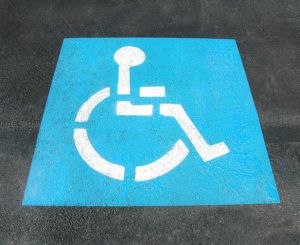The Americans with Disabilities Act (ADA)

The Americans with Disabilities Act (ADA) is a powerful tool available in some circumstances to protect caregivers directly (see the prior section on the ADA’s association clause) and to address the effect of caregiving: that is, intense stress and physical manifestations. (Of course, the ADA is also a powerful tool for protecting people suffering from disabilities that affect their ability to work.)
What Does It Mean to Have a “Disability”?
First, many people are reluctant to call themselves “disabled,” particularly if they suffer from depression or anxiety. For some, it seems wrong to claim a disability status because the iconic image of someone with a disability is a person suffering from a physical disability: for instance, a person in a wheelchair. Some don’t think of themselves as disabled if the condition is temporary, as with some types of depression or anxiety. If this describes you, I urge you to let go of your reluctance to seek protection under this statute. It doesn’t mean you are weak or a charlatan for claiming protection under the Americans with Disabilities Act. This law is there precisely to help people in your situation. Moreover, depending on your situation, the ADA may be the only legal remedy you have to protect yourself from wrongdoing in the workplace. And it is important that you seek the protections before you are fired, because you can only request accommodations while you are employed. The sad truth is that legal problems in the workplace can devolve into brutal hand-to-hand combat. To protect yourself, you need to use all the tools that you have.
Under the ADA, a person suffers from a disability if she has “(A) a physical or mental impairment that substantially limits one or more major life activities of such individual; (B) a record of such an impairment; or (C) being regarded as having such an impairment.” 42 U.S.C. § 12102(1). (The underlining is mine.)
Prior to 2009, it was more difficult to be qualified as a person with a disability because of the language regarding “substantial limitations.” The U.S. Supreme Court and other courts had narrowed the definition of disability, primarily by finding that the “substantially limits” prong required that an impairment last for a significant amount of time. So, if you had an impairment that affected you only occasionally, like asthma, for instance, you would not be protected by the ADA, even though asthma affects the “major life activity” of breathing.
Americans with Disabilities Act Amendment Act of 2008 (ADAAA)
No more. Congress amended the law instructing courts to back off. In 2009, Congress added provisions that make it very difficult for an employer to challenge an employee’s claim of disability. The amendments are called the Americans with Disabilities Act Amendment Act of 2008 (ADAAA). Indeed, the law now specifically provides that under the ADA, the emphasis “should be whether covered entities have complied with their obligations and whether discrimination has occurred, not whether the individual meets the definition of disability.” 29 C.F.R. § 1630.1(c)(4). Moreover, Congress expanded the definition of disability, explaining that “[a]n impairment need not prevent, or significantly or severely restrict, the individual from performing a major life activity to be considered substantially limiting.” The law goes on to provide that the term disability should be interpreted by courts to “favor a broad coverage of individuals.” Thus, under the new law, it is much more difficult for an employer to shirk its responsibilities under the law by claiming a health problem does count as a disability. Of particular relevance for pregnant workers, a condition that lasts fewer than six months, gestational diabetes, for instance, can qualify as a disability.
The other underlined prong above is major life activity. The law provides examples of major life activities, which are listed below. But note that this list does not include everything. So, don’t despair if what you are experiencing is not listed:
- Caring for oneself
- Performing manual tasks
- Seeing
- Hearing
- Eating
- Sleeping
- Walking
- Standing
- Lifting
- Bending
- Speaking
- Breathing
- Learning
- Reading
- Concentrating
- Thinking
- Communicating
- Working
- Sitting
- Reaching
- Interacting with others
The importance of this second list is that what constitutes a normal function of these systems is the province of a medical professional, not your HR department or even a judge. That’s why it is key in these cases to have a thorough medical diagnosis of any issues that you may be facing and have a doctor who will explain in writing for your employer why changes at work are required as part of any treatment.





